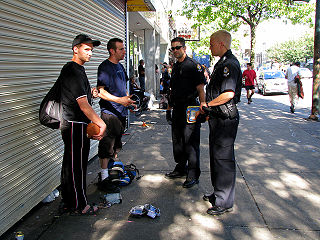
Larceny is a crime involving the unlawful taking or theft of the personal property of another person or business. It was an offence under the common law of England and became an offence in jurisdictions which incorporated the common law of England into their own law, where in many cases it remains in force.

Burglary, also called breaking and entering (B&E) and sometimes housebreaking, is the act of illegally entering a building or other areas without permission, typically with the intention of committing a further criminal offence. Usually that offence is theft, larceny, robbery, or murder, but most jurisdictions include others within the ambit of burglary. To commit burglary is to burgle, a term back-formed from the word burglar, or to burglarize.

The Theft Act 1968 is an act of the Parliament of the United Kingdom. It creates a number of offences against property in England and Wales.

The Theft Act 1978 is an act of the Parliament of the United Kingdom. It supplemented the earlier deception offences contained in sections 15 and 16 of the Theft Act 1968 by reforming some aspects of those offences and adding new provisions. See also the Fraud Act 2006.
In England, Wales and Northern Ireland taking without owner's consent (TWOC), also referred to as unauthorised taking of a motor vehicle (UTMV) describes any unauthorised use of a car or other conveyance that does not constitute theft. A similar offence, known as taking and driving away, exists in Scotland.
"Deception" was a legal term of art used in the definition of statutory offences in England and Wales and Northern Ireland. It is a legal term of art in the Republic of Ireland.
False accounting is a legal term for a type of fraud, considered a statutory offence in England and Wales, Northern Ireland and the Republic of Ireland.

Possession of stolen goods is a crime in which an individual has bought, been given, or acquired stolen goods.

Property crime is a category of crime, usually involving private property, that includes, among other crimes, burglary, larceny, theft, motor vehicle theft, arson, shoplifting, and vandalism. Property crime is a crime to obtain money, property, or some other benefit. This may involve force, or the threat of force, in cases like robbery or extortion. Since these crimes are committed in order to enrich the perpetrator they are considered property crimes. Crimes against property are divided into two groups: destroyed property and stolen property. When property is destroyed, it could be called arson or vandalism. Examples of the act of stealing property is robbery or embezzlement.

The Fraud Act 2006 is an Act of the Parliament of the United Kingdom which affects England and Wales and Northern Ireland. It was given royal assent on 8 November 2006, and came into effect on 15 January 2007.
Making off without payment is a statutory offence in England and Wales, Northern Ireland, Republic of Ireland and Hong Kong. It was first introduced on the recommendation of the Criminal Law Revision Committee and is intended to protect legitimate business concerns and applies where goods are supplied or a service is performed on the basis that payment will be made there and then. A taxi passenger who runs off without paying the fare at the end of the journey; and a motorist who fills up with petrol at a garage and drives off when the attendant is distracted. For these purposes, it must be proved that the defendant knew that payment on the spot was required or expected, and made off dishonestly with intent to avoid payment of the amount due.
Obtaining pecuniary advantage by deception was formerly a statutory offence in England and Wales and Northern Ireland. It was replaced with the more general offence of fraud by the Fraud Act 2006. The offence still subsists in certain other common law jurisdictions which have copied the English criminal model.
Obtaining property by deception was formerly a statutory offence in England and Wales and Northern Ireland.
Burglary is a statutory offence in England and Wales.

The Larceny Act 1916 was an Act of the Parliament of the United Kingdom. Its purpose was to consolidate and simplify the law relating to larceny triable on indictment and to kindred offences.
Abstracting electricity is a statutory offence of dishonestly using, wasting, or diverting electricity, covered by different legislation in England and Wales, Northern Ireland and the Republic of Ireland. The law applies, for instance, in cases of bypassing an electricity meter, reconnecting a disconnected meter, or unlawfully obtaining a free telephone call. In Low v Blease [1975] Crim LR 513 it was held that electricity could not be stolen as it is not property within the meaning of section 4 of the Theft Act 1968. In one reported case in 2015 a man was arrested for abstracting electricity by charging his mobile telephone on a train, but was ultimately not charged. Before the Computer Misuse Act 1990 those who misused computers ("hackers") were charged with abstracting electricity, as no other law applied.
Obtaining a money transfer by deception was formerly a statutory offence in England and Wales and Northern Ireland.
Evasion of liability by deception was formerly a statutory offence in England and Wales and Northern Ireland.
Obtaining services by deception is a statutory offence in the Republic of Ireland. It has been abolished in England and Wales and Northern Ireland.
The Criminal Justice Act, 2001 updates and consolidates the law relating to dishonesty and fraud in the Republic of Ireland.




